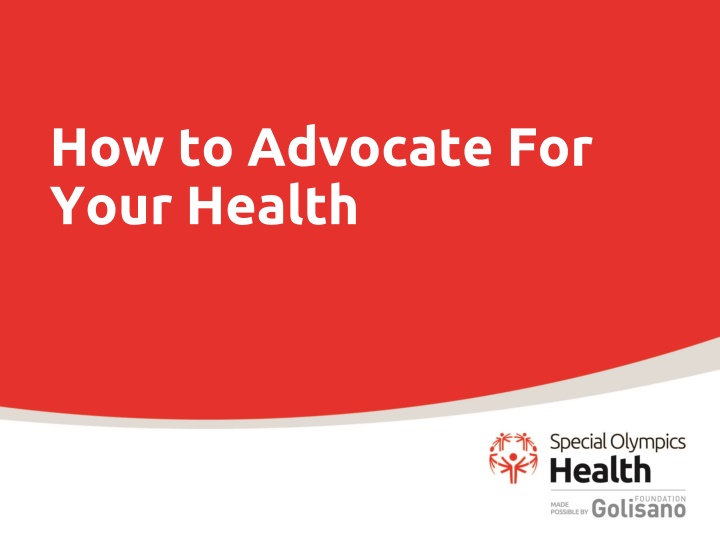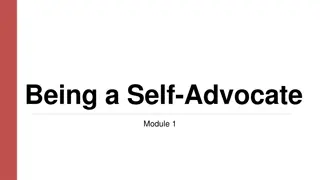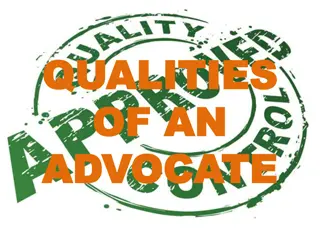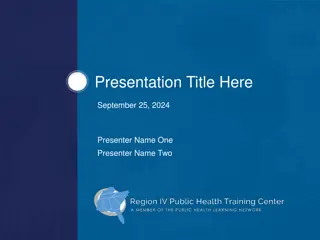
Empower Your Health: Self-Advocacy Tips and Strategies
Learn the importance of advocating for your health and those with disabilities, how to speak up effectively, who to engage with, and strategies for communicating with your health team. Empower yourself and others to prioritize health and wellness.
Download Presentation

Please find below an Image/Link to download the presentation.
The content on the website is provided AS IS for your information and personal use only. It may not be sold, licensed, or shared on other websites without obtaining consent from the author. If you encounter any issues during the download, it is possible that the publisher has removed the file from their server.
You are allowed to download the files provided on this website for personal or commercial use, subject to the condition that they are used lawfully. All files are the property of their respective owners.
The content on the website is provided AS IS for your information and personal use only. It may not be sold, licensed, or shared on other websites without obtaining consent from the author.
E N D
Presentation Transcript
How to Advocate For Your Health
What is Health Self Advocacy? 1. Speaking up for yourself and your health needs. 2. Speaking up for people who can t speak for themselves. 3. Standing up for your right to be healthy. Having your voice heard!
Why Is It Important To Speak Up For Your Health? 1. It is your body. 2. You are the one who knows how you are feeling or what you need. 3. You should have a say in decisions being made that directly impact your health.
Why Is It Important To Speak Up For People With Intellectual Disabilities 1. People with intellectual disabilities often lack access to health care, services and education in their communities. 2. People with intellectual disabilities have more health problems and die 16 years sooner than people without intellectual disabilities. 3. Everyone deserves to be healthy.
Who Can Be A Health Self Advocate? EVERYONE!
Who Should You Speak Up To? Anyone who can impact your health. Health care providers and workers Fitness and wellness professionals Universities Medical, dental and professional associations Policy Makers/Health Departments/Ministries of Health Businesses
How to Advocate for Your Health 1. Say what you want. 2. Be persistent. 3. Be polite and respectful. 4. Be assertive not aggressive. 5. Communicate in the way that works best for you. 6. Be prepared. 7. Practice.
How to Talk to Your Health Team 3 W s and an H 3 W s and an H Who Your name, where you live, challenges you have being healthy, if you make your own health decisions. What are some of things that health providers do that you like and do not like? What can people do to make you feel more comfortable? What Why Describe the reason for your appointment or meeting. How How can your health team communicate better with you and give you the best care possible?
How to Talk to Policy Makers 3 W s and an H 3 W s and an H Who Your name, where you live and how long you been an athlete What What are some of the challenges people with Intellectual Disabilities face to being healthy? Why Why should health policies and practices should be more inclusive of people with ID? How can policy makers make changes so that people with ID can live healthier, longer lives? How
Activity Prepare to talk to policy makers by creating 3 Ws and an H. 1. 2. Break into teams of two. Each person creates 3 Ws and an H: WHO: Say your name, where you live and how long you have been an athlete. WHAT: Share some challenges people with ID face to being healthy. WHY: Explain what health policies and practices should be more inclusive. HOW: Give ideas for what policy makers can do so people with ID can live healthier, longer lives. One person pretends they are a policy maker; the other is a Health Messenger advocating for the health of people with ID. Switch roles. 3. 4.
When Can You Start? TODAY!






















